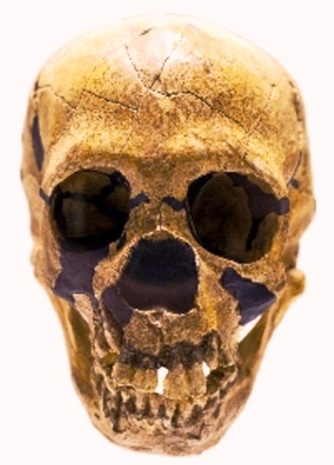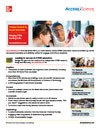Scientists have suggested a possible connection between ancient Neandertals (Homo neanderthalensis) and the severity of disease in patients affected by COVID-19. In short, certain genes acquired from Neandertals during instances of interbreeding with ancestors of modern humans (Homo sapiens) approximately 60,000 years ago may be involved in the susceptibility of individuals to severe disease from the virus that causes COVID-19. Specifically, researchers have identified a region on human chromosome 3 that possibly influences whether a person infected with severe acute respiratory syndrome coronavirus 2 (SARS-CoV-2) will become seriously ill and require artificial ventilation. This chromosomal region is almost identical to a segment found in the DNA of Neandertals from Croatia and Siberia, and present-day carriers of the Neandertal-derived gene variant on human chromosome 3 have an increased likelihood of developing life-threatening forms of COVID-19. See also: Chromosome; Coronavirus; Deoxyribonucleic acid (DNA); Gene; Neandertal DNA; Neandertals; Novel coronavirus is declared a global pandemic

Since the emergence of SARS-CoV-2 in humans in central China in November 2019, scientists have sought to understand the nature of the virus in order to halt its spread around the world and provide treatment to individuals who have been infected by the virus. As part of their research, scientists have undertaken analyses of the genomic makeup of infected individuals to determine if genetic factors could explain why people are affected in different ways by SARS-CoV-2. Some infected individuals show no symptoms or mild, coldlike symptoms, whereas others suffer severe respiratory distress, often leading to death. Thus, the discovery of a specific chromosomal variant in many of the most seriously affected COVID patients may provide researchers with more information for understanding and ultimately combating the disease. In general, approximately 2% of the DNA in people of European and Asian descent can be traced back to Neandertals. Scientists estimate that the Neandertal gene variation is carried by about 50% of people in South Asia and those of South Asian descent, and by about 16% of people in Europe and those of European descent. See also: Genetics; Genomics; Human genetics; Human genome; Neandertal genome
Researchers have determined that carriers of the Neandertal-derived gene segment are threefold more likely to require hospitalization and artificial ventilation due to COVID-19 as compared to noncarriers. However, scientists are unable to explain how or why this variant chromosomal region may lead to more serious illness in COVID-19 patients. Thus, the specific genetic features that confer risk for severe COVID-19 are unknown. Additionally, these features may not be unique with regard to SARS-CoV-2; they may be specific to other coronaviruses, other types of viruses, or other pathogens (for example, bacterial ones). Finally, genes are not the sole factors that determine susceptibility to COVID-19 disease. Age, general health, obesity, other diseases or underlying conditions, and adherence to preventative safety measures also contribute to the likelihood of both acquiring COVID-19 and being severely affected by the disease. See also: Critical care medicine; Epidemiology; Infectious disease





